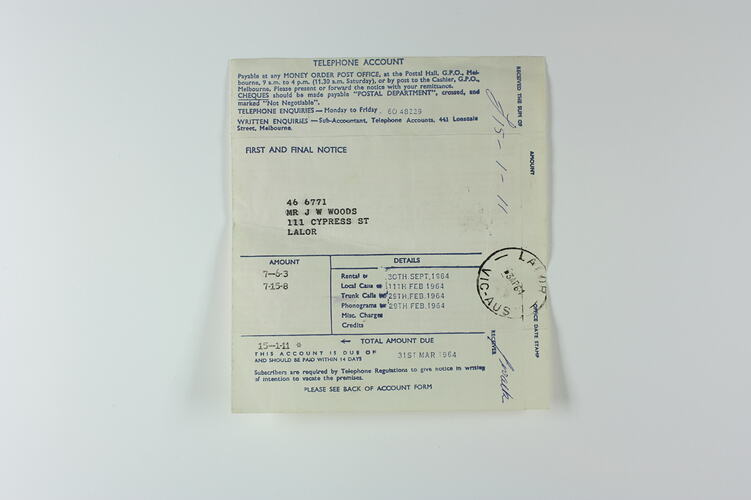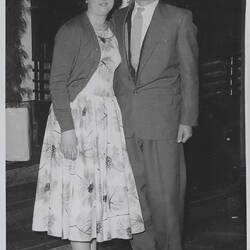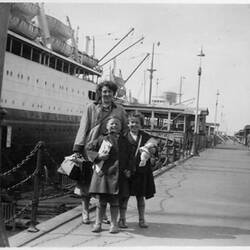Summary
Telephone account for calls and telephone rental charges issued to John Woods in Lalor, Melbourne, due 30 September 1963. It is one of a large collection of documents which trace the establishment of the Woods' family home and business during the 1950s and 1960s.
Barbara and John Woods had married in 1955 and were living in commission housing with extended family in Buckinghamshire, England when they decided to apply for the assisted passage scheme and migrate to Australia. They sailed on the Sitmar Line MV 'Fairsea' from Southampton in 1957 and eventually built their house in Lalor [also referred to in some items in the collection asThomastown] in 1960. They had a variety of jobs before they opened their own drapery store in Lalor and had four children.
Physical Description
Single page document printed in blue ink on white paper.
Significance
Statement of Historical Significance:
This collection of primarily shipboard documents provides a rare opportunity to represent the experiences of post World War II assisted British migrants who subsequently returned to Great Britain. Of more than one million people who migrated from Great Britain from the late 1940s through to the 1970s over one quarter of them returned home (and 25% of those returned again to Australia). These migrants, often referred to as 'ten pound Poms' were part of a systematic series of post-war immigration policies and procedures which favoured British immigration into Australia. The Leech family only stayed in Melbourne for three years, Eileen finding homesickness to much to bear, not an uncommon reason for people deciding to return home.
Assisted British migration was a constant theme of Australian immigration history until the early 1980s. Government assistance initiatives had an enormous impact on the composition and size of the Australian population, and can be viewed within the broader context of building a white British nation, on the national agenda since Federation and the formalisation of the white Australia Policy through the Immigration Restriction Act of 1901. The relaxing of such policies after World War II in the desire to rapidly increase Australia's population which migration from the UK could not fulfil alone, saw Australia's immigration policies and its social, cultural and economic landscape change forever.
More Information
-
Collection Names
-
Collecting Areas
-
Acquisition Information
Donation from Mrs Barbara Woods, 13 Feb 2014
-
Person Named
Mr. John Woods, Lalor, Greater Melbourne, Victoria, Australia, 30 Sep 1963
-
Inscriptions
'TELEPHONE ACCOUNT'
-
Classification
Migration, Settlement - first home & family, Financial records
-
Category
-
Discipline
-
Type of item
-
Overall Dimensions
140 mm (Width), 160 mm (Height)
-
Keywords
English Immigration, Assisted Immigration, Motor Vehicles, Telephones, Homes, Houses, Finances


